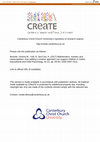Papers by Victoria Bonnett

Educational and Child Psychology
Background:Children who hold an incremental view of ability show greater perseverance, improved h... more Background:Children who hold an incremental view of ability show greater perseverance, improved help-seeking skills and are better able to cope with unexpected challenges. Classroom instruction can influence how children view themselves as learners.Aim:To explore how mastery-orientated classroom instruction, collaborative learning and metacognitive reflection can foster learners’ attitudes to their task performance. We hypothesised that using a mastery-oriented approach within a mathematics curriculum encourages metacognition, improves motivation and helps children achieve an underlying understanding of mathematical concepts thus improving mathematics performance.Method:This paper reports an 11-week project aiming to embed problem-solving strategies within a mastery-oriented whole-class environment. Children completed pre- and post-task semi-structured interviews and maths problems in addition to the 11-week collaborative maths project. Participants were 24 children from a rural pri...

Multi-touch tabletops are seen as devices that encourage equity in collaborative work: everyone c... more Multi-touch tabletops are seen as devices that encourage equity in collaborative work: everyone can join in, either by talking or doing, and people who say less sometimes tend to do more (Harris et al, 2009; Rogers et al., 2009). However, is it enough to consider equal contributions (verbal or physical) as measures of equity? In our work investigating how technology might encourage collaboration, we have been forced to question what ‘good ’ collaboration is. Adults using tabletops certainly tend to perceive them as encouraging greater equity compared to mouse input, for example (Marshall et al., 2009). But when making a good collaborative decision, is it really possible to say whose decision it was? In young children, close collaboration is marked by the ‘I did it! ’ bias: the tendency to attribute to oneself the actions of others, through ‘appropriating the mental experience ’ of the partner (Rogoff, 1990). In educational settings, a good tutor may often try to make an idea the chi...
This paper presents a classroom study that investigated the potential of using touch tabletop tec... more This paper presents a classroom study that investigated the potential of using touch tabletop technology to support children’s collaborative learning interactions. Children aged 710 worked in groups of three on a collaborative planning task in which they designed a seating plan for their classroom. In the single-touch condition, the tabletop surface allowed only one child to interact with the digital content at a time. In the multiple-touch condition, the children could interact with the digital content simultaneously. Results showed that touch condition did not affect the frequency or equity of interactions, but did influence the nature of children’s discussion. In the multiple-touch condition, children talked more about the task; in the singletouch condition, they talked more about turn taking. We also report age and gender differences.
Psychosis, 2018
Social disability in youth is an important precursor of long-term social and mental health proble... more Social disability in youth is an important precursor of long-term social and mental health problems. Social inclusion is a key policy driver and fits well within a new paradigm of health and wellbeing rather than illness-oriented services; yet little is known about social inclusion and its facilitators for 'healthy' young people. We present a novel exploratory structural analysis of social inclusion using measures from 387 14 to 36 year olds. Our model represents social inclusion as comprising social activity and community belonging; with both domains predicted by hopeful and dysfunctional selfbeliefs, but hopefulness more uniquely predicting social inclusion in adolescence. We conclude that social inclusion can be modelled for meaningful comparison across spectra of development, mental health and functioning.
Modelling Achievement Goal Orientation in the Ecolab: A Simulated Science Environment for Primary-aged Children
Artificial Intelligence in Education, 2009
The 14th International Conference on Artificial Intelligence in Education (AIED2009) is being hel... more The 14th International Conference on Artificial Intelligence in Education (AIED2009) is being held July 6--10 2009 in Brighton, UK. AIED2009 is part of an ongoing series of biennial international conferences for top quality research in intelligent systems and cognitive science for ...
Scaffolding effective help-seeking behaviour in mastery and performance oriented learners
Artificial Intelligence in Education, 2009
Abstract. In order to build learning systems that care we need to increase our understanding of t... more Abstract. In order to build learning systems that care we need to increase our understanding of the affective and motivational dimensions of learning. This will allow us to develop a model of our learners which extends beyond their behaviours to the feelings and motivations ...

Proceedings of the ACM International Conference on Interactive Tabletops and Surfaces, 2009
The potential of tabletops to enable groups of people to simultaneously touch and manipulate a sh... more The potential of tabletops to enable groups of people to simultaneously touch and manipulate a shared tabletop interface provides new possibilities for supporting collaborative learning. However, findings from the few studies carried out to date have tended to show small or insignificant effects compared with other technologies. We present the Collaborative Learning Mechanisms framework used to examine the coupling of verbal interactions and physical actions in collaboration around the tabletop and reveal subtle mechanisms at play. Analysis in this way revealed that what might be considered undesirable or harmful interactions and intrusions in general collaborative settings, might be beneficial for collaborative learning. We discuss the implications of these findings for how tabletops may be used to support children's collaboration, and the value of considering verbal and physical aspects of interaction together in this way.
Uploads
Papers by Victoria Bonnett